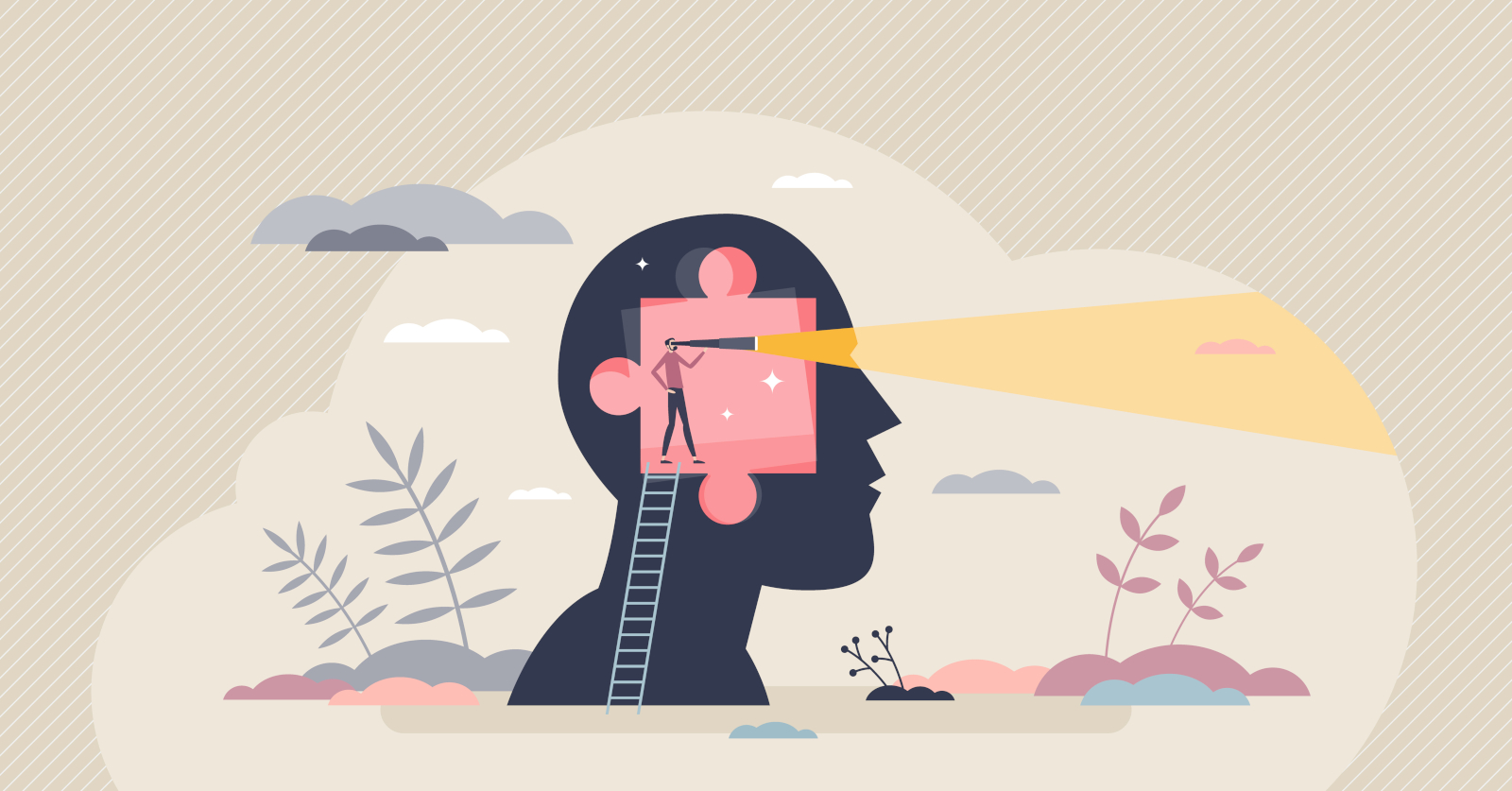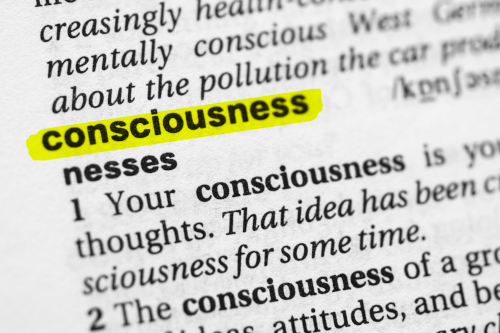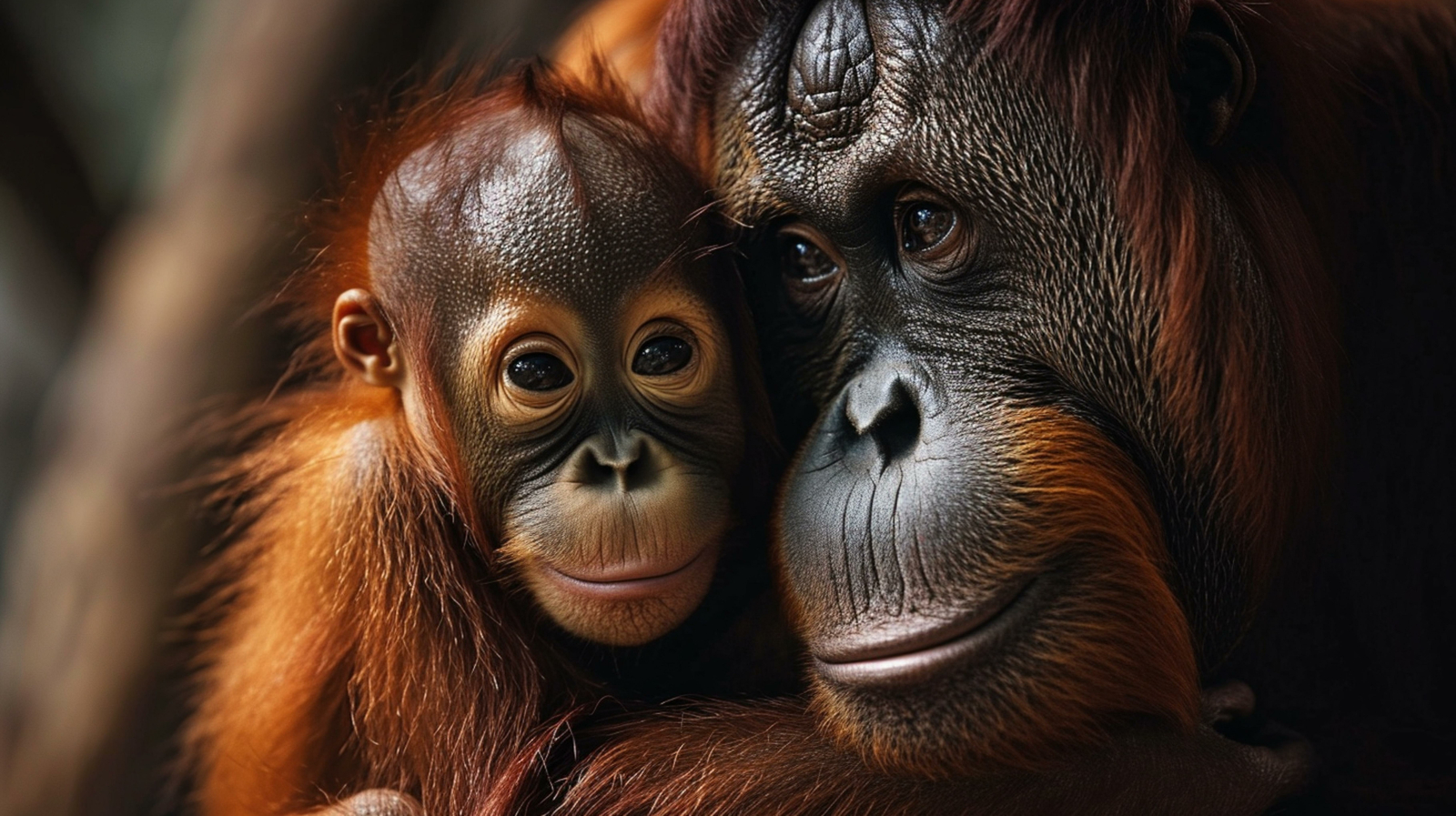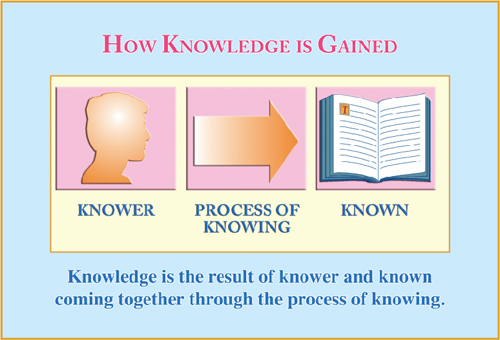- Home
- Consciousness
What does consciousness mean?
Without consciousness there would be no meaning at all in life. No one could even ask "what does consciousness mean?" We would be like zombies, intelligent biological robots who may be able to act in response to circumstances but who would have no awareness of doing so.
 Mannikin inside head looking out through eyes;
ID #488800010 © VectorMine | Adobe.com
Mannikin inside head looking out through eyes;
ID #488800010 © VectorMine | Adobe.comMoreover, if no-one had consciousness there would be no-one to appreciate the fact. No appreciation, no awareness, no experience, no knowledge. Life would be dead. The universe might exist but no one would know. There would be no point to its existence.
Consciousness is the foundation of all meaning. We need to understand it and develop it if we want to enhance our own appreciation of the meaning of life.
The dictionary meaning of consciousness
 Dictionary definition of consciousness;
ID 218536079 © Juanjo López | Dreamstime.com
Dictionary definition of consciousness;
ID 218536079 © Juanjo López | Dreamstime.comThe Penguin English dictionary gives the meaning of consciousness as "the state of being awake and aware of one's surroundings and of responding to them normally."
We can also look up “aware” in the same dictionary and read that “aware” means "to have knowledge". And “awake” means either that you have just emerged from sleep or that you are conscious of something that physically exists.
Also, the word "conscious" is made of two Latin root parts: "con" meaning "with" and "scious" deriving from the verb "scire" meaning "to know". To "be conscious" therefore means to "be with knowledge".
So the everyday answer to the question of what does consciousness mean is that it is a state of being which allows you to experience real objects and events in your surroundings, have knowledge about them and be able to respond normally to them.
Consciousness, the ability to know and experience
Knowledge comes from awareness, memory, experience and the ability to think. Also from our powers of intention and imagination, creativity and intelligence.
And of course, it is passed down to us by our parents and teachers.
The answer to the question "what does consciousness mean?" includes all these different factors. Yet in reality and for most people, it is simple. If you are awake and can think, if you can experience the world and make a creative response, if you can know and understand something, then you are conscious.
The idea of consciousness - that feature of existence which carries knowledge, that within which knowledge is structured - is usually left to philosophers and scientists to handle.
However, if we ordinary people are to develop our knowledge of the full meaning of life, then we will need to know something about the meaning of consciousness and its different states, including the higher states.
Then we can consider how to develop our own consciousness to create deeper levels of meaning in our own life.
So, back to basics.
Towards a satisfactory definition of consciousness
 Consciousness as a lightbulb over woman’s head; ID 14682101 | A Lightbulb © Richard Thomas | Dreamstime.com
Consciousness as a lightbulb over woman’s head; ID 14682101 | A Lightbulb © Richard Thomas | Dreamstime.comThe definition must say something about "me" since I am the one who knows. It must also say something about how my mind works to connect me with the outside world via my senses, intellect, memory and imagination. And it must also say something about spirituality and how I can develop it, since it is through the development of my own consciousness that I can become aware of the holistic meaning of life.
A detailed answer to the question "what does consciousness mean?" must include reference to all of the important factors of life: mind, body, spirit, the social and cultural world and the nature of life itself. It must go to the heart of what it means to be human.
Waking, dream and sleep states of consciousness
 Sleeping and waking cartoon;
ID 137387986 © Olga Kurbatova | Dreamstime.com
Sleeping and waking cartoon;
ID 137387986 © Olga Kurbatova | Dreamstime.comEveryone cycles through the waking, dreaming and deep sleep states of consciousness on a daily basis and each state presents its own different version of reality.
In the waking state, we are awake and aware of our surroundings and we can experience objects, events and processes in what we usually think of as the real world. We can also choose actions in response and we can learn as we go along.
In the dream state, our experiences turn out to be a fantasy of memory and imagination, only realised when we wake up.
In deep sleep, we are unaware of any particular thing or event - as if the "real" world has disappeared - but we can be woken up at any time.
From a biological and medical point of view, the dreaming and deep sleep states of consciousness support life in the waking state by allowing our minds and bodies to recover from fatigue and stress and to help us consolidate the experiences of the day.
However, there is no doubt that the nature of reality is experienced differently in each different state.
A fourth state of consciousness - transcendental consciousness
 Woman in deep meditation;
ID 189396973 | Deep Meditation © Fizkes | Dreamstime.com
Woman in deep meditation;
ID 189396973 | Deep Meditation © Fizkes | Dreamstime.comThe popularity of Transcendental Meditation in the 1960s enabled physiologist Robert K Wallace to identify a fourth major state of consciousness - transcendental consciousness, characterised by deep physiological rest at the same time as expanded inner awareness.
In this state of deep "restful alertness", arrived at effortlessly through Maharishi's Trancendental Meditation, the meditator is not aware of any particular thing but is silently awake in a state of inner peace and contentment.
In this state of consciousness, wakefulness is present but awareness is open only to its own nature. We say that consciousness is "self-referral".
This is the beginning of "Self-realisation" - the process of realising the true, cosmic nature of the Self.
Adding the experience of this fourth state to the other three in a regular daily cycle relieves stress, integrates the personality and stimulates a more rewarding experience of the world outside meditation. It adds an important new dimension to the question of what does consciousness mean.
It also stimulates spiritual development - the development of an awareness of the wholeness of life.
If the practice is continued on a regular twice-daily basis, a significant development of human consciousness takes place leading to three even more enlightened "higher" states of consciousness (see below).
Development of the experience of the fourth state of consciousness through regular and sustained practice is the gateway to Enlightenment, the state in which the meaning of life grows to its full value.
Senses and Organs of Action
 Senses and organs of action image;
ID 4811379 © Tatyana Chernyak | Dreamstime.com
Senses and organs of action image;
ID 4811379 © Tatyana Chernyak | Dreamstime.comFurther to the question " what does consciousness mean?" we find that, in order to be aware of our surroundings, to experience the objects and events that are a part of our life, we must have senses. That means ears to hear with, eyes to see with, fingers to touch with, tongue to taste with, nose to smell with.
And we must have the mental functions of memory, imagination and intellect to go with our senses, otherwise we cannot know what our senses are telling us.
Not only that, we must be able to use that knowledge. We must be able to “respond normally”. That requires organs of action - arms and legs, hands and feet and the ability to express ourself - through speech, for example.
Although we usually think of the senses and organs of action as being part of the physical body, a little thought tells us that they are rooted in the mind. How else could you experience something, formulate an intelligent response to it and then put that into effect?
Senses, organs of action and the creative intelligence to link them meaningfully together as we experience and live in the world are all a part of the meaning of consciousness.
This is the mystery of consciousness. Physical or chemical changes in our brain are converted into mental images and sensations - and vice versa. How is this trick accomplished? We'll have a closer look at this mystery on other pages:
"philosophy and consciousness" page
"the mind-body problem" page
Consciousness and creative intelligence
 Intelligent animals: mother and baby Orangutan; ID 699779119 © Julia | Adobe.com
Intelligent animals: mother and baby Orangutan; ID 699779119 © Julia | Adobe.comCreative intelligence is an intimate part of the nature of consciousness. The very state of being in which you are aware of your surroundings requires intelligence; your ability to respond requires creativity.
Being aware of your surroundings means you can recognise things, analyse movements and make appropriate responses. All of which require creative intelligence.
Like the senses and organs of action, creative intelligence is certainly reflected in the body, for example in the way the brain works, but it is a fundamental property of consciousness. The more "awake and aware" you are, the more creative intelligence you will display in your actions.
Transcendental consciousness links your own individual intelligence with the creative intelligence of the universe, bringing the support of nature to every endeavour.
More on consciousness and knowledge
 Knower, Knowing and Known
Knower, Knowing and KnownMaharishi taught that "knowledge is structured in consciousness". This is the motto of Maharishi schools and colleges everywhere.
The basic structure of knowledge is a three-fold one:
- The knower - the self that knows
- the known - the object of knowledge, that which is to be known
- the process of knowing - the specific qualities of creative intelligence that link the first two together to create a lively piece of knowledge.
For knowledge to be complete, all three aspects of consciousness must be complete and functioning coherently together.
The self is an inner and more silent value of consciousness whilst the known is an outer and more active value. Therefore creative intelligence, the dynamic aspect of consciousness which creates knowledge and governs our intelligent responses to experience, must serve as the link between the inner and outer values of life.
Higher states of consciousness
When the mind is purified and completely clear, the self
becomes the Self, the most silent and cosmic value of the ability to know. Then
knowledge is really complete because it is grounded in the home of all
knowledge.
Maharishi taught that "knowledge is different in different states of consciousness". This is obvious for the three states of consciousness already described - waking, dreaming and sleeping. What I know when I am awake is different from what I know when I am asleep. The kind and quality of knowledge is completely different.
In addition, there are three "higher" states that need to be considered. States of consciousness in which the quality of knowledge becomes ever more refined and truthful. In properly answering the question "what does consciousness mean?" we must take these higher states into account.
Maharishi described those three higher states as:
- Cosmic consciousness, in which the experience of life is founded on the permanent realisation of the Cosmic Self.
- God consciousness, in which life is lived in the light of God
- Unity consciousness, in which all experience, inner and outer, is linked in a harmonious grand wholeness of universal awareness.
We will go into more detail about these states on other pages, such as the page on the spiritual meaning of consciousness.
What does consciousness mean?
Conclusion
A full definition of consciousness requires both a body and a mind working intelligently together to construct the details of an individual awareness. Plus a spiritual and cosmic essence which provides the basic ability to be awake and aware.
Consciousness is therefore a property of a body-mind complex - an organism - set in a world shared with other such organisms. On this understanding it is reasonable to think that every living being has some kind of individual consciousness, including their own spiritual essence which gives them life.
The quality of consciousness displayed in the world by each such individual organism is dependent on the physical form of the species and of the unique life-history of the individual. Different species have different potentials for experience and response.
The mind-body complex at the heart of every individual has inputs and outputs. The inputs are constrained by the senses and the outputs by the organs of action. The inputs and outputs have both mental and physical aspects. For example, an eye is part of a body and thus physical, yet an eye functions to produce the mental sensations of sight.
Connecting the inputs and outputs together is an intelligent processing system which when viewed objectively from the outside looks - in the human being - like nerve structures and brain processes but which from the inside is experienced as mental states of different kinds involving sensations, memories, desires, feelings, thoughts, knowledge, direct experience, imagination, discrimination, intention and volition.
Importantly, individual consciousness is always personal – it belongs to someone. For example, your consciousness, my consciousness, Jane's consciousness, Felix the cat’s consciousness. I am always at the centre of my own consciousness and you of yours.
Yet, consciousness also has a cosmic foundation; it is universal in its essential character of wakefulness.
The foundational state of the universe is a singularity of pure wakefulness, within which the potential existence of countless individuals is held and from which they are projected into their own worlds to express their own degree of creative intelligence.
Ultimately, consciousness is a paradox: It is both one and many; both silent and dynamic; both an indivisible unified whole and a totality comprised of an infinite number of interacting parts.
Further details in answer to the question "what does consciousness mean?" can be found on other pages.
- Home
- Consciousness